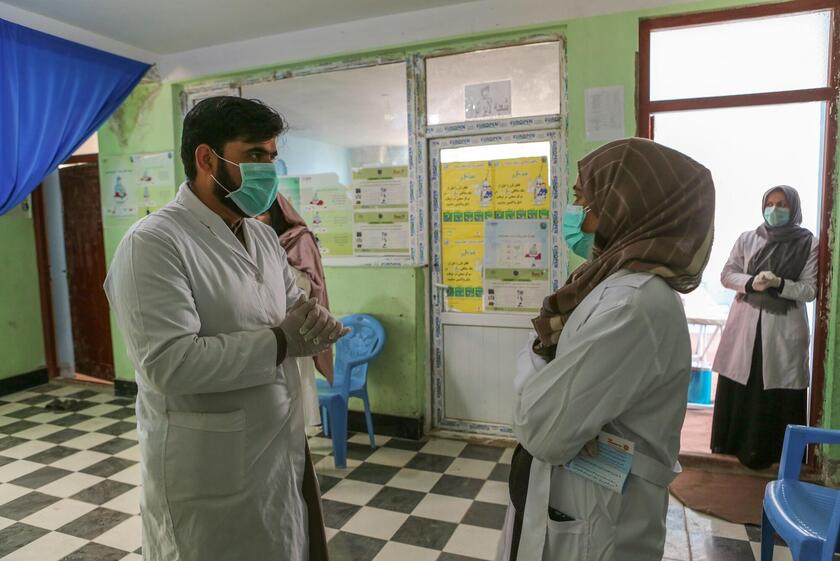Afghanistan: Johanniter Survey Highlights Special Dangers for Women due to Corona Pandemic
Berlin / Kabul, 27 May 2020
The Johanniter team and partner organisations in Afghanistan conducted a representative survey on COVID-19 among Afghan health workers. Every 13th infected person works in the health sector. By mid-May, thirteen health workers in Afghanistan had died, and more than 871 tested positive. The pandemic has worsened the treatment situation, especially for women. Johanniter is expanding protective measures against the virus.

In order to determine the causes and to be able to take measures to protect the medical staff, Johanniter and Five Afghan partner organisations conducted a representative survey at the end of April. 213 doctors, nurses, midwives and medical support staff in eight Afghan provinces were interviewed.
According to the survey, the knowledge about the new virus is good. However, only 36 percent of those surveyed received training on the Corona virus (SARS-CoV-2) from official bodies. The rest obtained their knowledge from the media, but did not use the official sites of the Ministry of Health. As a result, the majority of the staff is misinformed.
Many of the interviewees believe that COVID-19 leads to death and have therefore closed their practices or greatly reduced the operations of the facilities out of fear.
The survey also reveals that special screening facilities were only available in every second health facility. Therefore, separate waiting areas for women for treatment and diagnosis of COVID-19 were often missed out. Also, the medical staff in the facilities is mainly male. As a result, women have less access to general health care and COVID-19 testing.
We are very concerned that women in particular no longer go to the doctor or hospital for fear of infection. As a result, the number of treatments in mother-child care, prenatal and postnatal care, and vaccinations has dropped sharply in recent weeks.
Expand Fever Screening, Set up Rooms for Women

Johanniter, which has already intensified its health and risk education activities since the beginning of the pandemic, will continue to expand these activities. For example, the fever screening and surveillance of people at entry points to major cities, carried out in cooperation with the Afghan Ministry of Health, will be intensified. Separately set up screening rooms and trained female staff will provide women and girls with access to COVID-19 testing as well as medical treatment. Together with religious leaders and community elders, Johanniter also wants to increase risk awareness among the population.
High number of unreported cases feared
A lack of testing capacity, many returning migrants from Iran and Pakistan, and almost one million internally displaced persons living in slums in the countries major cities make containing the virus extremely difficult. Moreover, Taliban claim to have greater influence of Afghanistan's territory. It is hardly known whether there are infections here, as the data is not reported to the Afghan Ministry of Health. Tests by NGOs in Taliban-controlled areas were very limited, as there was a fear of a high spread of the virus in their ranks. The Afghan Ministry of Health therefore fears a far higher number of infections in the country.
Background
Johanniter has been active in the medical sector in Afghanistan for over twenty years. The survey was conducted in cooperation with the partner organisations BRAC Afghanistan in Helmand Province, AADA, active in Faryab, Nangarhar, Ghazni and Herat, ACTD in Khost, OHW in Kabul, and JACK in Kunduz. The survey was mainly conducted by telephone and reached out to health staff at regional, provincial, district and community level in eight provinces of Afghanistan. The majority of respondents came from provincial and regional hospitals, followed by district hospitals, comprehensive health centres, primary health care facilities and private clinics. The survey will help Johanniter and other organisations to improve health care in connection with COVID-19 and to improve the protection of medical staff from infections. Increased protectative measures for the health sector are urgently needed to help save others.
Here you can download the survey "Health Worker’s Perception Survey on COVID 19 KNOWLEDGE, ATTITUDE AND PRACTICE ASSESSMENT IN EIGHT PROVINCES OF AFGHANSITANV" as PDF file.
What we do against Corona worldwide
We are adapting our current project activities to respond to the worldwide corona pandemic.